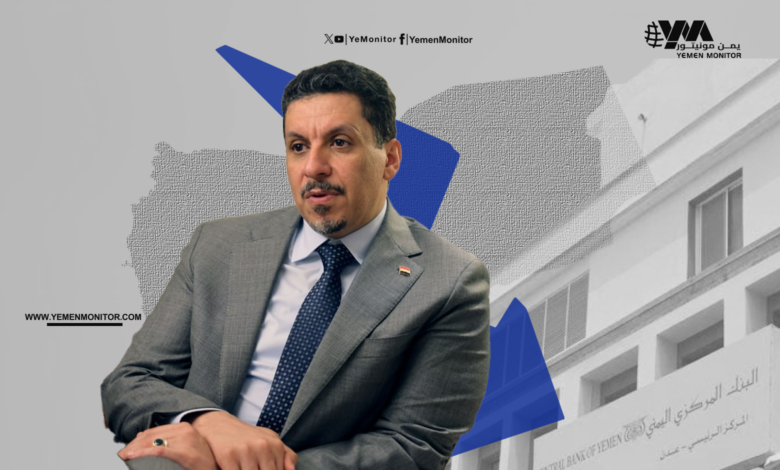
Yemen Monitor/Newsroom:
A recent research report issued by the Mocha Center for Strategic Studies, on the government’s approach to reducing corruption, revealed that the flow of funds from Saudi Arabia and the UAE contributed to leniency in financial and administrative control procedures and the efforts of the Yemeni government in combating corruption, especially as the two countries were engaged – themselves – in competition with the Houthis to attract Yemeni individuals and entities to the side of the legitimate authority. Deviations and errors have turned into original trends in the structure and orientations of the legitimate authority.
The center said in its report that in the absence of political will, anti-corruption policies have completely disappeared from the priorities of the legitimate authority’s governments, despite the passage of ten years since their re-establishment and the building of their institutions. The presence of corruption has expanded further with the formation of the Presidential Leadership Council, and the components that make up the council have recorded a remarkable consensus in sharing corruption, despite their differences and conflicts over almost everything.
The center’s report explained that with the decline in government resources, since October 2022, due to the ban on oil exports, and the decline in financial support provided by the two countries of the “Arab Coalition,” and even more so the collapse of the value of the national currency and the erosion of its purchasing power significantly, and in parallel with the rise in prices, corruption has become a serious threat to the legitimate authority, especially with the closure of the paths of settlement and military action alike, and the remaining of most of the state’s leaders outside the country, and their receipt of large monthly financial payments in hard currency.”
The report concluded that the responsibility lies with the Yemeni parties, especially the Presidential Leadership Council, the political parties, and the other supporting components, as well as the external parties, to mobilize political and financial support for the paths of financial and administrative reform, and the fight against corruption, which are adopted by the current government.
The center stressed the need to expedite the government amendment, considering it an urgent step that must be hastened, as the Presidential Leadership Council and the participating and supporting components must facilitate the implementation of the ministerial amendment requested by the Prime Minister, Ahmed Awad bin Mubarak, as soon as possible, in order to enable the formation of a homogeneous government that works in a spirit of one team, and moves forward in carrying out the tasks and duties assigned to it, including the paths of reforms and confronting corruption.
The report also stressed the need to implement the changes required by referring the corrupt to the judiciary, removing corruption reduction measures from political tensions, adopting a single approach to confronting corruption, and intensifying international community support.
The forms and practices of corruption are numerous and widespread, and include the seizure by military formations in a number of governorates of a considerable part of the state’s resources, through levies and collections that exceed hundreds of millions of dollars, and the gross corruption practiced by some governors of the governorates that have a share of oil and tax revenues, as it is rumored that a governor of a governorate that has a share of oil revenues seized (40) million dollars, and the governor of a neighboring governorate seized about (27) billion Yemeni riyals, which were frozen from his balances while he continues to be pursued for supplying tens of billions embezzled from public funds.
Corruption is most evident in the purchase of oil and fuel for the operation of electric power in Aden, as its value exceeds hundreds of millions of dollars; in addition to the imbalances in the contracts of the Aden refineries, as the imbalance in one contract cost an estimated (180) million dollars, and its implementation continued improperly for nine years; which caused the waste of billions of dollars that could have been used to buy oil derivatives.
In the file of consulates and embassies, employees in the Yemeni embassy in Egypt seized up to (268) thousand dollars from consular income revenues, through forgery in official documents, and the Yemeni consulate in Jeddah did not comply with supplying the amounts collected from passport issuance fees and special fines, where the gap reached more than (156) million Saudi riyals.
In general, the reports of the Central Agency for Control and Auditing, which were recently allowed to be published, and which represent a simple sample, revealed the existence of more than twenty cases in several areas, and the volume of embezzlements in them amounted to more than one billion and seven hundred and twenty million dollars, all of this, in addition to the monthly payments in hard currency, which amount to nearly ten million dollars per month, received by government officials, most of whom reside outside the country, through what is called the “subsistence allowance.”
The Corruption Perceptions Index (CPI) for 2024, published by Transparency International, confirms that Yemen is one of the most corrupt countries in the world, as it received a score of 13 out of 100 on the index, and the report indicates that corruption poses a major challenge in the country, which has been suffering from an ongoing conflict for 10 years and weakness in public institutions.




